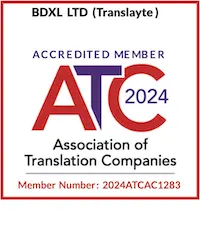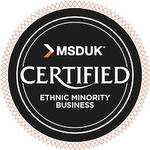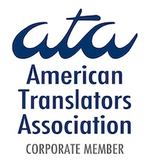Certified Birth Certificate Translations Accepted Worldwide
A birth certificate is one of the most important legal documents, often required for immigration, visa applications, marriage registrations, legal proceedings, and academic or employment verification.
If you’re submitting an official application and you’ve been asked to provide proof of your age, nationality, family lineage, or place of birth, then it’s highly possible that you’ll have to present your birth certificate.
If that birth certificate isn’t issued in the official language of the authority that you’re applying to, then you may be asked to provide an official or certified translation of your birth certificate.
In countries all over the world, official translations can mean different things entirely. While some require translations to be completed by sworn or accredited translators, others mandate notarisation or legal certification to validate authenticity. Without the correct certification, your document may be rejected or cause delays in your application process.
With Translayte, we work hard to understand official translation requirements across most countries, so you can be sure that the birth certificate translation you get is the one you need.
Certified vs. Standard Translation: What’s the Difference?
When translating a birth certificate, it’s essential to understand the difference between certified and standard translations to ensure your document is accepted by the relevant authorities.
A standard translation is a translation that can be done by anyone fluent in both languages. It is ideal for documents or text-based content for personal or business use. Common examples include manuals, blog posts, and product descriptions. While this may help with general understanding, it lacks legal validity and is usually not accepted for official purposes such as immigration, visa applications, or legal proceedings.
A certified translation, on the other hand, is a professionally completed and legally recognised translation. It is conducted by a qualified translator who is fluent in both the source and target languages. Certified translations come with an official certification in the form of a signature, stamp, and statement from the translator attesting to their accuracy and completeness, making them valid for use by government agencies, universities, and legal institutions.
Birth certificates are official documents that serve as proof of identity, nationality, and family relationships. Because of their importance, most authorities require a certified translation when the original document is not in the official language of the receiving institution.
Certified translations are typically needed for immigration and visa applications, legal proceedings, marriage & adoption processes, and education & employment. To avoid rejection of documents, it’s best to work with a professional translation service that specialises in certified document translations. Get your birth certificate translated quickly and accurately today!
Why You Need a Birth Certificate Translation
As we’ve already mentioned, there are several reasons that you could be asked to translate your birth certificate. Usually, you’ll be looking to translate that certificate to support one of the following applications:
- Visa or residency application;
- University/College application;
- New passport application (through naturalisation or other means);
- Marriage (both at home and abroad);
Birth certificates are one of the most important documents you’ll need to submit with each of these official applications.
Your birth certificate will prove your age. However, important family details are also confirmed with a full birth certificate translation.
This is especially important when it comes to visa applications. Depending on your circumstances, you’ll be asked to complete a specific visa application form. Your birthright, eligibility for residency and other crucial information could be determined by your birth certificate. For example, if your parents were born in the UK, then your right to UK residency will be different to another person whose parents were not born in the UK. The birth certificate identifies all of this.
But it only does so when it’s presented in the correct language. If you present a birth certificate which isn’t in the language of the host country you’re applying within, then you’re likely to have your whole application rejected.
Translation Requirements for Birth Certificates
Birth certificates, like any other supporting document, must be submitted in the language of the country in which your application takes place. Not only does your document need to be translated, but it needs to be an official translation. The definition of an official translation varies from country to country.
Once you’ve been asked to translate your birth certificate, you’ll first need to establish the local translation requirements. For instance, your birth certificate translation could either be certified or a sworn translation. You may also require notarisation and/or legalisation (Apostille) depending on your specific use case.
In the United Kingdom, Ireland and the United States, for example, you will be required to produce a certified translation of your birth certificate, which must contain:
- confirmation from the translator that it is an accurate translation of the original document;
- the date of the translation;
- the translator’s full name and signature;
- the translator’s contact details.
If you’re submitting your birth certificate as part of a Visa or Residency application to specific embassies in these countries, you may also be required to produce a Notarised or Legalised Translation. These are produced in slightly different ways, and we provide additional information on our page about certified translations.
In some European countries like France, Germany, Italy and Spain, you may be asked to provide a ‘sworn translation’ of your birth certificate instead of a certified translation. This applies to several other EU countries too, and some countries in South America (e.g. Brazil).
Sworn translators take an oath in court and must personally declare that the work they carry out is accurate and reliable to the best of their knowledge. Once they’ve translated your document, an official stamp with their details will deem the translation ‘sworn’ and acceptable for official use.
When having your birth certificate translated by us, it is usually helpful to let us know the country you’re applying to, so we can ensure the translation is certified correctly.
Birth Certificate Translation for Immigration
When applying for immigration, visas, residency, or citizenship, a birth certificate is one of the most essential documents required by authorities. It serves as proof of identity, nationality, date of birth, and family lineage, helping officials verify your background. If your birth certificate is issued in a language different from the official language of the country you are applying to, you will need a certified translation to ensure it is legally recognised.
For example, the United States Citizenship and Immigration Services (USCIS) requires a certified translation for all foreign-language documents submitted with immigration applications. This means the translation must be complete, accurate, and accompanied by a signed certification statement from the translator or translation service. Failure to provide a USCIS-compliant translation can lead to application delays, rejections, or requests for resubmission, affecting your immigration process.
At Translayte, we specialise in USCIS-compliant birth certificate translations, ensuring they meet all legal and formatting requirements. Our team of professional translators provides high-quality translations with guaranteed acceptance, giving you peace of mind that your document will be recognised by immigration authorities. With a focus on accuracy and fast turnaround times, we help you avoid unnecessary complications.
Choosing a professional translation service ensures your document is legally valid and correctly formatted, preventing delays or additional requests from immigration offices. If you need a certified birth certificate translation for USCIS or any other immigration body, let Translayte handle the process with efficiency and expertise.
Birth Certificate Translation for ID/Driver’s License (DMV)
When applying for a state-issued identification card or driver’s license, the Department of Motor Vehicles (DMV) requires a birth certificate as proof of identity, age, and legal presence. This document is essential for verifying your eligibility to obtain a driver’s license or state ID. However, if your birth certificate is issued in a language other than English, you must provide a certified translation to ensure it is accepted.
State DMVs require accurate and officially certified translations that maintain the exact details of the original document. Any errors, missing information, or uncertified translations can result in your application being delayed or rejected. A professional translation ensures that your birth certificate meets the DMV’s legal standards, allowing for a smooth and hassle-free application process.
For passport applications, the U.S. Department of State requires a birth certificate as proof of citizenship or nationality. If the birth certificate is not in English, a certified translation must be provided alongside the original document. Without a certified and accurate translation, your passport application may face processing delays or be declined.
A properly translated birth certificate ensures that all names, dates, and places of birth are correctly interpreted, preventing administrative issues during the application process.
Birth Certificate Translation for University Admissions & Study Abroad Applications
When applying for university admissions or study abroad programs, institutions often require a birth certificate as proof of identity, nationality, or residency. Universities and educational authorities use this document to verify age, citizenship status, and legal eligibility for enrollment. However, if your birth certificate is in a language different from the official language of the institution, you will need a certified translation to ensure it is accepted.
Many universities, scholarship programs, and immigration offices require accurate and officially certified translations to process applications smoothly. A non-certified or inaccurate translation could lead to application delays, requests for resubmission, or even rejection. Some institutions may also require that the translation be completed by a professional translator or accredited translation service to guarantee its validity.
A certified birth certificate translation ensures that all personal details, dates, and official stamps are translated accurately and formatted according to institutional requirements. Whether you're applying for an undergraduate program, postgraduate studies, exchange programs, or international scholarships, having a correctly translated birth certificate is a key step in your application process.
How to Translate Your Birth Certificate
Given the complexities around understanding the local translation requirements and finding a suitably qualified translator, it is often advisable to use a certified translation agency that understands the local requirements, works with reliable translators, and can deliver your translation quickly and at a fair price.
At Translayte, we specialise in providing certified and sworn translations of your birth certificates, and you can rest assured that your translation will be delivered quickly, at a fair price, and will be accepted.
How It Works
- Navigate to 'Check Prices & Place Order' on this page.
- Select “Certified translations”.
- Select the source and target languages respectively.
- Upload your documents to be translated.
- Select the type of certification you require.
- If you want expedited services, select that option. Provide any extra instructions after this.
- Click "PROCEED TO ORDER"
- Make the payment securely online. Once your order is placed, our team will assign it to a professional translator, and you'll receive the translated document within the specified timeframe.
Why Choose Translayte
At Translayte we understand that accurate and effective translation is crucial to your success. Our commitment to excellence, experienced team of professional linguists, and dedication to customer satisfaction set us apart from other translation companies.
- Experience: Our team is made up of highly qualified and experienced translators, editors and proofreaders, specialised in various sectors and languages. We guarantee accurate translations that capture the nuances and subtleties of your original content.
- QA: We follow a rigorous, multi-step quality assurance process, including multiple rounds of review and editing to ensure that your translations are accurate, clear, and culturally appropriate.
- Speed: We understand the importance of meeting deadlines and are committed to delivering your translations on time, without compromising quality. We offer flexible delivery times to suit your project needs and can accommodate urgent requests.
- Confidentiality: We take data privacy and security very seriously. All members of our team are subject to strict confidentiality agreements and we use the latest encryption technologies to protect your files and information.
- Personalised service: We value our clients and are dedicated to offering personalised attention to each project. Our active customer support team is available 24/7 to address your concerns and answer any questions you may have.















 Austria
Austria Belgium
Belgium Brazil
Brazil Poland
Poland Portugal
Portugal Switzerland
Switzerland Turkey
Turkey UAE / Dubai
UAE / Dubai Bulgaria
Bulgaria








